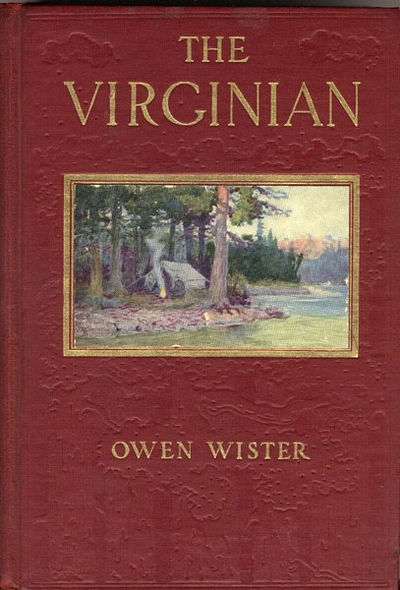Book Review: The Virginian by Owen Wister
“When you call me that, smile!”
When the Easterner who would become known as “the Tenderfoot” came to Wyoming at the behest of Judge Henry, he didn’t know what to expect. What he got was the acquaintance and eventually friendship of the man called “the Virginian”, one of Judge Henry’s hired men. Soft-spoken but with a steely core, the Virginian would do battle with less good men, and win the heart of a woman of character. This is his tale.

This American classic was originally published in 1902 (though parts were written much earlier) and is considered by some to be the first “adult” Western novel, as opposed to the cheap adventure books primarily aimed at young readers that did much to shape the Western genre. It’s based in large part on Owen Wister’s own experiences visiting the West in the 1880s to recover from bouts of ill health. The Virginian himself is a fictional character, but men of his type were among Wister’s friends.
Neither the Virginian nor the Tenderfoot are ever actually named; at one point the Virginian is called “Jeff” but he disclaims this as a friendly nickname due to his Southern heritage. One of the first things we learn about the title character is that while he’s willing to cheerfully accept verbal abuse from his friends, the same words from a relative stranger will spark a definitely unfriendly reaction. (This is the outward manifestation of the start of enmity between the Virginian and the low-down Trampas.)
Much of the novel is also taken up with romance. Mary Stark Wood is a schoolmarm from New Hampshire, come West to escape the expectation that she will marry the young man who’s interested. She’s of excellent family descent, and rather proud; learning to let go of that pride and admit she loves the Virginian enough to go through life with him is part of her character arc.
The Virginian, for his part, does not rest on his laurels as a man of action, even though rescuing Mary from a bad situation does spark her attention in the first place. He works at improving his vocabulary and knowledge of literature and philosophy so that he can be a better husband. Not so surprising, as Mary’s intellect is part of what attracted him in the first place.
Fans of Western action need not fear boredom, however. There are rustlers and horse thieves about, and not every situation can be settled with words or a practical joke. (Some readers may find the baby-switching prank too much for their forgiveness.)
There’s some period sexism and racism. The latter is perhaps most pointed up when Scipio le Moyne makes a point of telling the Tenderfoot that his family “has been white for a hundred years.” Back in the 1880s, “Scipio” was most often a black man’s name, after Scipio Africanus. Another issue that comes up is cruelty to animals, particularly in the person of horse “trainer” Balaam.
The book is dedicated to Wister’s good friend, Theodore Roosevelt, and was written when the memory of the Old West was still fresh–Mr. Wister mentions that some parts in the final chapter were originally written in present tense, but the passage of time before publication required they now be past tense.
Overall, this is a fine example of American writing, of equal interest to fans of Westerns and romance. Highly recommended.
Oh, and before I forget, this book has been adapted for movies and television (the latter taking great liberties.) Here’s a trailer for the 1946 version:

